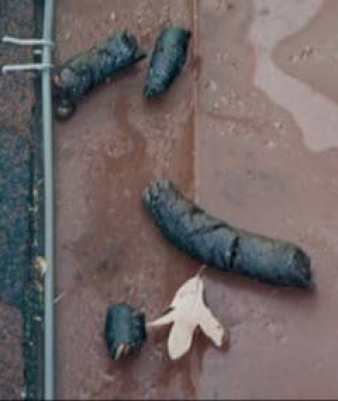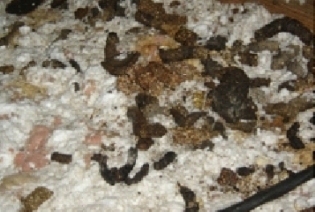Raccoon poop is tubular, has blunted ends, and is usually dark in color, though coloration is subject to change depending on what the raccoon has recently eaten. Extreme caution is required when cleaning up raccoon poop. Their feces can contain thousands of roundworm eggs (Baylisascaris procyonis) that are harmful to both humans and domestic pets.
Call a professional immediately if you found raccoon poop in your attic.
Need Help with Raccoon Infestation?
Find a Critter Control near you.
What Do Raccoon Droppings Look Like?
Raccoon poop is tubular in shape, has blunted ends, and is usually dark in color, though coloration is subject to change depending on what the raccoon has recently consumed. Undigested food like berries, nuts, or grains can be present in the raccoon scat. It does look similar to other animal droppings like opossum poop or skunk poop.
raccoon feces
Do Raccoons Poop in the Same Place?
Raccoons create communal latrine sites to defecate. Outside latrine sites can be found at the base of trees, in forks of trees, or on raised areas such as fallen logs, stumps, or large rocks. If you find a latrine site in your home or yard, it is an indication of a raccoon infestation.
Raccoon latrines in your yard can be in wood piles, on or under decks, or along fence lines. Latrine sites will be in the area the raccoons have create a den. Most commonly , that will be in in the attic.
raccoon feces in the attic
Health Risks Associated with Raccoon Droppings
Extreme caution is required when cleaning up raccoon latrines because of the health risks. Raccoons are the primary hosts of raccoon roundworm (Baylisascaris procyonis). Their feces can contain thousands of roundworm eggs (Baylisascaris procyonis) that are harmful to both humans and domestic pets if accidentally ingested.
Leptospirosis can spread through raccoon urine. People and animals can get infected when water or soil contaminated with the urine of infected raccoons gets on their skin, or in the nose, mouth, throat, or eyes, or is swallowed.
Raccoon Poop in Attic Clean Up
Since close proximity to raccoon droppings can lead to the contraction of diseases or parasites, individuals should always wear disposable gloves, shoe coverings (booties), or rubber boots, and a respirator when cleaning up raccoon poop.
What Do You Do if You Find Raccoon Poop in Your Backyard?
Do not ignore raccoon poop outside. It can be especially dangerous to dogs or other pets. Raccoon roundworms and leptospirosis can still spread to soil or objects. In your yard, latrine sites are usually on logs, stumps, bases of trees, fence lines, or large rocks. Raccoons can also designate areas on and under your porch as latrine sites.
Outdoor Latrine Cleaning
- Feces and material contaminated with raccoon feces should be removed (using a shovel or inverted plastic bag) and burned, buried, or bagged and placed in the trash to be sent to a landfill.
- Most chemicals do not kill roundworm eggs, but heat will kill the eggs instantly. Treat feces-soiled decks, patios, and other surfaces with boiling water or a propane torch.
- Disinfect hard, smooth surfaces (including shovel blades) with boiling water.
- To help further reduce the risk of possible infection, wash your hands well with soap and warm running water. Clean/launder your clothes thoroughly using hot water and detergent.
If there is consistently new raccoon poop every night in your yard, you need to find a raccoon control solution. The raccoon is either finding food, water, or shelter in your yard. Limit access for effective raccoon control in your yard.
Professional Raccoon Poop Disinfectant and Raccoon Control
If you found raccoon poop in your attic or home, there was a raccoon infestation. The raccoon needs an entry hole about the size of a grapefruit. Without raccoon exclusion repairs, raccoons or other wild animals can get into your house. Raccoons will also damage insulation, electrical wiring, and in extreme cases fall through ceilings.
Given the dangers, individuals are much better off contacting trained wildlife specialists to remove pest raccoons and clean up scat and urine. Critter Control technicians have the training and equipment to safely sanitize homes. More information on raccoon removal.
Get them out.
Keep them out.®
Experiencing a wildlife or pest issue? We can help! Complete this form and your local Critter Control® office will contact you to assist.
- How to Get Rid of Raccoons
- Are Raccoons Dangerous?
- Raccoon Trapping Service
- Raccoon Control
- Baby Raccoons
- Dead Raccoon Removal
- Raccoon Diseases
- Do Raccoons Hibernate in Winter?
- Raccoon Damage
- Raccoon Diet
- Raccoons In Yards
- Raccoons in Basements
- Raccoons in Chimneys
- Raccoons in Crawl Spaces
- Raccoons in Houses
- Raccoons in Trash
- Raccoons in Trees
- Raccoons in Walls
- Raccoons on Roofs & in Soffits
- Raccoon Sounds
- Raccoon Tracks
- Raccoons in Attics & Ceilings
- What Does a Raccoon Look Like?

